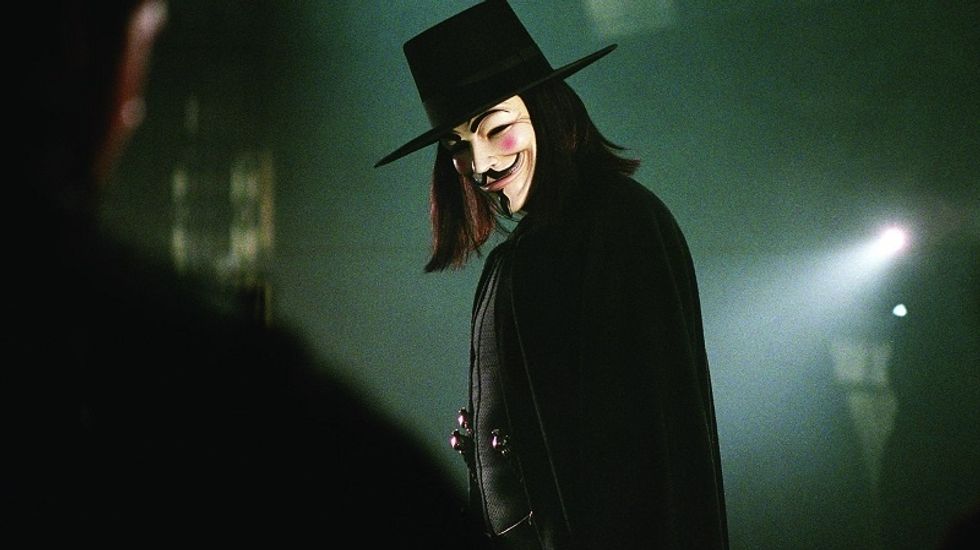CULTURE
We Are Anonymous: A Brief History of the Internet’s Most Elusive Hacktivist Collective
10 Feb, 20

via We Are Anonymous
Anonymous is back.
Today, the hacktivist group broke a long silence and delivered a few stunning blows to institutions of power. They briefly took down the Minneapolis Police Department’s website and threatened to expose the department’s “many crimes to the world”. These crimes include the murder of George Floyd, which has sparked a wave of protests across the nation.
“Officers who kill people and commit other crimes need to be held accountable just like the rest of us,” said an Anonymous narrator in a video originally shared on Facebook. “Otherwise, they will believe that they have a license to do whatever they want. People have had enough of this corruption and violence from an organization that promises to keep them safe. After the events of the past few years, many people are beginning to learn that you are not here to save us but rather you are here to oppress us and carry out the will of the criminal ruling class. You are here to keep order for the people in control, not to provide safety for the people who are controlled. In fact, you are the very mechanism that elites use to continue their global system of oppression.”
Anonymous also leaked a long list of people alleged listed in Jeffrey Epstein’s “Little Black Book,” his collection of addresses of people who ran in the notorious pedophile’s circles. Some of the implicated included Donald Trump, Mick Jagger, and the Royal Family. Some people on Twitter are also saying that the platform is deleting the documents shared by Anonymous, which include what appears to be an affidavit accusing Trump of pedophilia.
In response to this and to nationwide protests against the death of George Floyd, Trump designated ANTIFA—a leftist activist group loosely associated with Anonymous, if at all—as a terrorist association.
It’s near impossible to know what’s true or what’s real right now, but one thing is clear: Anonymous is back, and with a vengeance.
But what is Anonymous? To answer that unanswerable question, we’ll have to look back in time to bygone era: the early 2000s.
Once upon a time, the Internet was less a broken mirror of reality and more a diversion from it.
Maybe that’s why prior to the era of identity monetization, blue check marks, and self-branding, anonymity was synonymous with power.
In the early 2000s, a group known as Anonymous sprung up across digital platforms, born out of a spirit of loose anarchism and disruption. “Anonymous” or “Anon” is an umbrella term, and like the Internet itself, the group was always slippery and amorphous.
Between 2003 and 2018, Anonymous’s loosely interconnected network of digital hacktivists took on everything from Scientology to the Clintons to ISIS to Trump. At some point, they fractured, and it’s unclear as to whether they still exist in any unified context. Was Anonymous an idea? A joke? A movement?
Attempting to answer these questions is a doomed enterprise from the start, because the group is (or was) so decentralized, so scattered, and so complex that it resists exact definition.
But perhaps Anonymous can also teach us something about our modern political moment—after all, the group was entwined with many of the major political forces of the past decade, from Occupy Wall Street to the Arab Spring to QAnon. Maybe it can teach us something about the art of modern rebellion, especially in a rapidly digitizing and artificial age when information is poised to become the most valuable currency of all.
Welcome to the netherworld of Anonymous, where everyone can be no one.
Born of Trolls, Hackers Turn to Scientology
The hacktivist network known as “Anonymous” arose around 2003. Springing up on 4chan, the group began as a collective of tricksters harnessing the Internet to pull pranks and seed an ethos of trolling and general disarray.
Anonymous eventually gained global reach thanks to its appealing ethos of decentralized leadership and general anarchical spirit. With memetic virality, it spread thanks to broad, decentralized messaging techniques and an emphasis on both humor and justice.
Today, two images are usually associated with Anonymous. There’s the Guy Fawkes mask from the 2006 film V for Vendetta, which follows one activist’s quest to end a totalitarian fascist rule in England; and there’s the “man without the head” image that symbolizes the group’s commitment to decentralized, anti-authoritarian rule.
Early on, the group embarked on helter-skelter actions and pranks, with mixed results. The group targeted the white nationalist figure Hal Turner in 2006, eventually exposing him as an FBI informant, and Anonymous first began to dive into high-profile political activism through an effort called “Project Chanology,” a coordinated protest against the Church of Scientology. After the Church removed a video of Tom Cruise because they believed it portrayed them negatively, Anonymous hackers started a campaign to take down Scientology once and for all. They posted a video called “Message to Scientology” and launched a crusade against the church, which included a coordinated attack on the organization’s website.
And so a movement was born. Thousands of people showed up in real life to protests around the country. “It was a very bizarre scene,” the former hacker Gregg Housh said of the protest he attended in Los Angeles. “Here is a church created by a science-fiction author, being protested by people wearing masks created by a science-fiction author.” Reality was bending; the simulation was showing its cracks.
For the next decade, Anonymous would harness the Internet in unprecedented ways, fighting for justice and destruction, for irony and distraction, and for change that would reverberate all the way to the top.
WikiLeaks and the Arab Spring: Anonymous Gets Political
Anonymous quickly shifted focus towards censorship and free speech. They used DDoS (Distributed Denial of Services) attacks to shut down websites they viewed as threatening to freedom. In 2010, they emerged to protest a censorship bill in Australia; and later that year, they collaborated to defend WikiLeaks after Amazon kicked Julian Assange’s operation off its servers and Visa, Mastercard, and PayPal stopped processing donations to the group. (Anonymous later separated itself from WikiLeaks, due to Assange’s influence over the organization).
Around the same time, a segment of the group decided that they’d collectively become too serious. They needed more “lulz”—LOLs, laughs, the trolling ethos that originally inspired the group. So a group called Lulz Security (or LulzSec) was born. They hacked the CIA’s website. The next month, the FBI arrested fourteen Anonymous hackers for the aforementioned earlier attacks on PayPal, and Anonymous began to rise on the US government’s radar.
In 2011, when the Tunisian government blocked WikiLeaks, Anonymous launched a crusade to support protestors in the movement that would eventually spark the Arab Spring. One of the more infamous leaders of LulzSec, Hector Xavier Monseguer (or “Sabu”)—who would later become an FBI informant—and others also allegedly helmed a DDoS attack on the Tunisian government’s websites. Anonymous was also integral to the planning of 2011 Occupy Wall Street protests in New York, which were somewhat similar to the organization in that they lacked internal structure and clear leadership and set goals.
Soon, White House staff became concerned that the group could destabilize the US power grids. The group became known as cyber-terrorists and anarchists. Perhaps out of necessity, or because its major players were being taken out or growing up and leaving hacktivism behind, Anonymous fractured around 2015 and 2016, leaving behind conspiracies and a legacy of rupture and chaos.
Still, Anonymous’s penchant for social action continued throughout the 2010s. In 2013, “Operation Safe Winter” fought to raise awareness about homelessness. In 2014, a group called “Operation Ferguson” organized cyberprotests against the police after the death of Michael Brown.
In 2015, Anonymous shifted its focus towards the Islamic State. #OpISIS was a response to the Charlie Hebdo attacks in Paris;and despite being a largely uncoordinated effort, it still managed to make waves. “For more than a year, a ragtag collection of casual volunteers, seasoned coders, and professional trolls has waged an online war against the Islamic State and its virtual supporters,” writes E. T. Brooking. But they never lost their irreverence.
“Taking away the free speech from a group that is advocating the end of free speech is delicious fun,” a member wrote on a Reddit forum about the Hebdo operation.
“They rise up most forcefully when it comes to Internet freedoms and technology, particularly technology that is being abused in some way,” says Brian Knappenberger, creator of the documentary We Are Legion. “They’re sort of protectors of the Internet. This is their territory, and if it’s abused, they’re personally offended.”
In the latter half of the 2010s, Anonymous waged war against pedophiles and the dark web. In 2018, they lashed out at QAnon, the pro-Trump conspiracy group that stole Anonymous’s branding despite a complete lack of alignment with most of Anonymous’s central ideologies.
Some members of Anonymous may have gone off to join QAnon; it’s hard to know. Though different from Anonymous, QAnon shares some of Anonymous’s hatred of the government—its “deep state” paranoia echoes Anonymous’s fears of totalitarianism.
Today, QAnon members often show up at Trump campaign rallies, and though Anonymous and QAnon have very different ideas about what constitutes freedom and free speech, it’s clear they both believe they’re fighting for it.
In the wilderness of the Internet, especially when so many layers of irony interlace with each other and when trolls abound, it’s easy for ideologies to twist out of form. It’s easy for trolls to be mistaken as criminals, too—just as it’s easy for trolls to become criminals. On the Internet, at least outside the realm of corporate influence and bribes, identity is as fluid and amorphous as you want it to be. Anonymous members can become Trump supporters who can become Bernie supporters who can become QAnon supporters who can become FBI informants who can then rejuvenate Anonymous.
If the Anonymous movement shows us anything, it’s that identity and ideology are not set. They’re as fluid as the shifting landscape of the World Wide Web, which might just be a reflection of the shifting tides of the human spirit.
Remembering Anonymous in 2020
If you Google Anonymous, you’ll see the question “is anonymous good”? pop up on the search bar.
A short search will reveal that most self-proclaimed authorities on the subject believe that Anonymous is neither good nor evil. Instead, it’s a diverse group made up of people from all around the world, bound together by a shared symbol rather than a structure or hierarchy.
Because Anonymous never had a set ideology or leader, there’s no one precise way to understand them. There’s no way to know what’s real, or if Anonymous was ever the super-group that the media made it out to be. Most likely, it was more of an idea than anything else, though it may still exist in pockets. There’s also no way to tell if the group has just gone further underground or if it truly has been dead for years.
According to Gabriella Coleman, Anonymous was always about freedom and secrecy. “They dramatize the importance of anonymity and privacy in an era when both are rapidly eroding,” she writes.
In terms of ethos, Coleman argues that Anonymous embodied an ancient trickster archetype, using old ideas about freedom, hedonism, and the randomness of the universe to cope with an increasingly unbearable modernity. “Nietzsche was attuned to the vitality of sensuality, myth, and art. Music, poetry, and even the mad laughter of the trickster Dionysus, who he championed, offer an aesthetic life of pleasure,” she writes in her book Hacker, Hoaxer, Whistleblower, Spy: The Many Faces of Anonymous. “They are pursuits through which humans can overcome their limits and the tragic condition of life: ‘Not by wrath does one kill but by laughter. Come, let us kill the spirit of gravity!'”
Is Anonymous nothing more or less than an idea, which became a movement and an identity? Was it all just a story? Has the story ended, or has it fractured and bled into other movements and other corners of the Internet?
Someone in a Guy Fawkes mask is out there, laughing.
The Anonymous forum on Reddit is alive and well. A month ago, one Redditor mused, “Is Anonymous just a legend to teach us that we do not need a name or an organization to use our power?” Could Anonymous have been a myth designed to reveal that ‘All of us can anonymously exploit the options that we have (elections, commercial decisions, jobs we chose, freetime activities) to change the world together?'”
A few months ago, #AnonHasBeenDeadForYears trended on Twitter. Some agreed with the hashtag. Some warned the world that Anonymous has never been dead—instead, it’s everywhere.
These are the kind of conversations that Anonymous inspires. Half-ironic, half-imbued with radical visions—zombified, always mutating—Anonymous (or whatever remains of it) persists.
Maybe it persists in part because it, ironically, offered a form of identity, of differentiation, of meaning crafted through collectivity born out of a crisis of meaning. Perhaps in anonymity, there is identity.
“On the street…I am just another person in a sea of faces,” writes a (fittingly) anonymous blogger in Dazed, in a piece that may or may not be a parody or a fake—we’ll never know. “But in cyberspace we are different. We helped free the people of Egypt. We helped fight against Israel as it attempted genocide. We exposed more than 50,000 paedophiles around the world.” Now they’re fighting police brutality and the carceral state.
“We have taken to the streets to fight for the rights you are letting slip through your fingers,” the blogger continues. “We are Anonymous.”
Are you?















